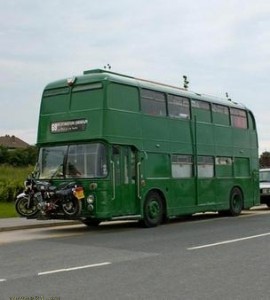In this interview Tomasz Oryński talks to Phil Jeffcock, a British man who converted a double-decker bus into a home to live life on the open road.
 Have you ever dreamed about living the life of free man? To do not be a slave to debt, a mortage, to be able to work only where you really want to, to move freely around the word meeting new people and seeing new places all the time? Meet Phil Jeffcock, who decided to change his life and does just that.
Have you ever dreamed about living the life of free man? To do not be a slave to debt, a mortage, to be able to work only where you really want to, to move freely around the word meeting new people and seeing new places all the time? Meet Phil Jeffcock, who decided to change his life and does just that.
Tomasz Orynski: As I understand, you toyed with the idea of living on a bus for 15 years or so…Was it changes in your personal life that finally prompted you to do it?
Phil Jeffcock: I actually bought the bus about two weeks before I split up with my wife, which was totally unrelated. The idea was to move into the bus when it was completely finished, so I wanted to fix it up during my summer holidays for two or three years, after which my kids would be in their mid-20s and so my wife and I could go on long holidays in it. But when we split up, I had the choice between going to look for a flat or basically moving into a bus which was already there. I decided to go for it and I think it was 20th of September 2011 when I first spent the night on the bus. I just chopped some seats out of the top deck, dragged a double bed up there and that was my first night. I just took if from there.
TO: So you actually just jumped in at the deep end?
PJ: Yeah, you could say that.
TO: Your costs were around £9,000 pounds, but I guess you did most of the work yourself…
PJ: That’s true, I did all the work myself.
TO: And how does it work with parking? Are you allowed just park, wherever you want?
PJ: Well, in the early days I stored the bus on a friend’s farm but I could not stay there if I wanted to live in it, so I moved to a little campsite nearby. At this point the bus was still a bus, so I took three weeks off work and spent it working on the bus in the campsite. At this time, mind you, I had a completely normal life with a wife and two children and all the usual commitments. It took me some time to find my way out of it, to sort it out, or in other words to unplug myself. I installed so called off-grid solar systems. It’s something similar to the ones that you can see on narrow boats (actually lot of the technologies I have on my bus are borrowed from barges). It cost me about £1,500 pounds with the inverter and then on top of that I had to buy deep-cell batteries, similar to those that are used in electric fork trucks. These were the best investments ever because I bought the power generator straight away and it was about second week of November before I needed to switch it on, so I was completely self-sufficient with regard to energy from May to November, even though I am using domestic appliances such as a washing machines etc. The idea of the project straight from the beginning was that I would use all the normal domestic appliances. People ask me why I don’t use special equipment manufactures for caravans, but that stuff is too compromising. It might be good if you go with your caravan for a week and you kind of manage, but this, this is my home! You don’t want to live all my life using chemical toilets and all that stuff. Thanks to the design of the bus, I don’t need to move it for anything. It is completely self-sufficient for a month to six weeks at the time.
TO: As for this living off the grid, what about dumping waste, how have you solved that problem? Are you doing that just when no one look is looking, or is it legal?
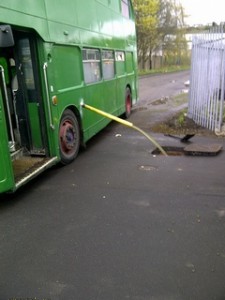 PJ: Well, it is not technically illegal. In the back garden there is an inspection hatch for the sewages and that’s all I need. I always insure that I put it into the sewage waste system and there is no shortage of them, you can find a few at every industrial estate.
PJ: Well, it is not technically illegal. In the back garden there is an inspection hatch for the sewages and that’s all I need. I always insure that I put it into the sewage waste system and there is no shortage of them, you can find a few at every industrial estate.
TO: And you do it how often? Once in few weeks?
PJ: Once per month or even less often.
TO: So I can see that it won’t be a problem to anyone.
PJ: No, it’s not a problem at all. You know, I take a great care to save the environment. I like to think green. That’s why I don’t splash out with water. With a little bit of smart thinking you can save a lot of water just by using it wisely in minimal amount needed for the job.
TO: And where do you get fresh water from? Do you just rely on nice people or are there some special places where you can refill your tanks?
PJ: No, it’s not a problem at all. I just ask whenever I end up. I just usually speak with people for a while and they let you refill. I am also planning to put an ordinary domestic gas boiler, just convert it to LPG. And that would heat the radiators around the bus.That way I will able to keep the constant temperature and I won’t have that situation anymore that I am waking up in the morning and there is no heat around the bus…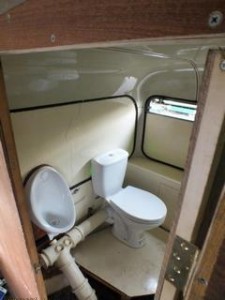
At the moment I am using a wood burning stove. It is good and warms up the bus quickly. It is 17-18 degrees within about half an hour from lightening it up – it’s downstairs, where for now my workshop is and where I plan to have my living room in the future, and the chimney goes upstairs through the bedroom, so it is warmed up soon as well. For now I also have one of these gas heaters so that when I am back from work and just want to wash myself and go to sleep, I don’t lighten up the wood burner, I just use the gas heater.
TO: So do you have two separate electric systems – one for the bus, for the driving lights, engine starter and everything, and one for the domestic use?
PJ: I have actually three: all the bus systems are completely separate. Apart from that I don’t want to drain batteries too quickly, so everything that can work efficiently on 12 volts – water pumps, car radio works on it. And for the big domestic appliances I use 230V battery. My power generator has three battery chargers plugged into it. But when I want to charge my laptop, mobile phone, I draw the power from the batteries. I use it also for watching TV, cooking, my microwave etc. At the moment it keeps me running for about three nights then I put my power generator on for about 8 hours and
charge everything up again. I try to do not use too much fuel in my generator – at the moment I use less than two gallons per week. The thing with electricity is that even if you have a tiny, tiny generator, they still use 0.8 litres per hour. That equates to about one pound per hour. So to watch television that is powered by this generator you pay a pound per hour. You watch TV for the evening – that’s a fiver. The way I do it – using a bigger generator to produce energy and then storing it is much more efficient. And I need to use it only at this time of the year.
TO: During the summer your solar panels are sufficient for all your needs?
TO: Ok, so we’ve learnt lots of technical information, but there are also some non-technical question I would like to ask you. For example, do you experience any stigma because you live on a bus? I know the travelling community can be subject to quite a lot of discrimination – with no fixed address, do you experience this also?
PJ: It’s not such a big problem, because the bus has a sort of character that distinguishes me from them. When I took three months off last year, I would pick a nice spot and staying there for 4, 5 days – I stayed in some really beautiful places. What I found was that everyone walking past was willing to talk to me so I got a chance to meet new people all the time. They seemed to see me as some lucky, relaxed guy. People thought it was a great idea and often said they wished they could do the same. But when I came back to look for work, I had some strange looks even though I am an experienced, capable driver and I know what to do with wagons. I have spent most of my life driving wide loads and heavy haulage. But I knew how it will looks like with me being from nowhere, so what I did was I parked by a level crossing nearby and stayed there for about a fortnight, without any problems. I introduced myself to a local people and the town council– if people get to know you, they are happy to help, to advise you where you can get a job etc. I also had my Facebook account, but what ended up happening was everyone who I bumped into wanted to add me, but you know what happens when you open your Facebook page to everyone: you get loads of bullies and ignorant people and it soured quickly. So I opened a separate Facebook account for my bus, Yasmin Greenbus… Do you know where that name came from?
TO: No, I have no idea
PJ: The place that I bought the bus from, that was using it for the last 20 years, used to name their vehicles after family members. Yasmin was the owner’s granddaughter, so I used Yasmin Greenbus. It looked nice on Facebook.
It’s funny, some people are very suspicious and think that I am one of these tree-hugging guys from Peace-camps, and they expect that there will be 7 or 8 buses soon following me. Once they see that I am on Facebook, it helps a lot. They feel better knowing that they can check up on me without even approaching me.
TO: And when they get to know you, do their attitudes change?
PJ: I can understand people being alarmed at the beginning, I’ve been to some lovely villages and I always go to the local pub so people can approach me and get to know me. People who are thieves and that sort of thing usually do not integrate with the local community, so by getting out to the local people, I can assure them that I am not a threat.
TO: But it is not only their safety, but also your safety is important. You got broken into once, right?
PJ: Yeah. I sometimes to go out for the weekend and I park right outside the pub so I don’t need to take a taxi. I stopped in Wrexham one night, in an area I didn’t know, and it turned out it was quite dodgy and one morning when I was away from the bus, someone broke in and took my laptop and my phone…
TO: But that was only incident?
PJ: Yeah that was the only one time, and it ended well as they were trying to drive the bus away, which could be disastrous, but luckily they did not managed to do that.
TO: Do you have an alarm fitted now?
PJ: Yes, now I have an alarm fitted and I activate it when I am away or going to sleep.
TO: And how about your cat? Cats are said to get very attached to particular places, isn’t she confused that every time she goes, she finds herself in a new place?
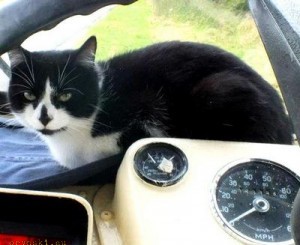 PJ: Her territory is the bus. As for exploring the outdoors, she is very comical. Sometimes I stop for a while, for fuel for example, and she jumps out and I continue my journey without realising she’s not on board. When I eventually realize, I have to turn around and go back and she sits and waits patiently for me. I stop, she jumps in, comes to lie in her spot on the dashboard and we are off on the road together again. I have actually lost her a couple of times but she always manages to find her way back. Down here where I am just now, there is a little snack bar just around the corner and the workers from the neighbouring industrial plants come to have their lunch in the snack bar, and everyone gives her a bit of this or that. She just sits there waiting for the next treat and simply loves it.
PJ: Her territory is the bus. As for exploring the outdoors, she is very comical. Sometimes I stop for a while, for fuel for example, and she jumps out and I continue my journey without realising she’s not on board. When I eventually realize, I have to turn around and go back and she sits and waits patiently for me. I stop, she jumps in, comes to lie in her spot on the dashboard and we are off on the road together again. I have actually lost her a couple of times but she always manages to find her way back. Down here where I am just now, there is a little snack bar just around the corner and the workers from the neighbouring industrial plants come to have their lunch in the snack bar, and everyone gives her a bit of this or that. She just sits there waiting for the next treat and simply loves it.
O: So how do you feel living without all the ties of everyday life, do you feel that you live outside of the system in a way?
PJ: You can’t really stay outside the system. You can’t live without fixed address. You need it for driving licenses etc… I just use my son’s address for such things and have never had any problems with it. The only instance that might be problematic is if I wanted to get a disclosure, criminal record check. It’s not getting one that would be a problem as I have never had any problems with the law or anything, but the thing is that to obtain one you need to send to them a utility bill in your name. For me it’s impossible, I just can’t get a bill with the same address on it, but it’s not a problem for me, I am not bothered by that.
TO: And from what I can see from other people’s comments on your internet entries, you are living out a dream of many people, who would like to something similar but perhaps aren’t brave enough to go for it.
PJ: And you know, I can understand that. Doing this is not about bravery. I took it from the idea of living on a barge. Many people with common sense live on barges, but it was just not for me, because it is so regulated, which I hate. If you stay on the waterways you either have to move around every fortnight or pay mooring charges, which makes it not much cheaper than living in ordinary flat. In my bus I have a much bigger living space than on a barge and I am not tied to the water – I can drive it virtually anywhere.
TO: So there is much more freedom in your way of life.
PJ: Living on the bus is also much cheaper. A normal household has three main bills, rent or the mortgage, water rates and council tax. Whilst I am not avoiding them, I am free from them. So these payments for a normal households must to be at least 150-200 per week, depending of your housing situation. My equivalent is keeping the bus taxed, tested and insured – so my living costs in that sense are less than 15 pounds per week.
TO: So you have more time for yourself, as you don’t need to work as much to pay for all this.
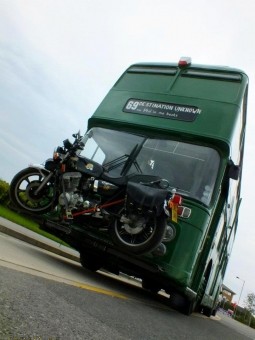 PJ: In my ideal world I would just work three days per week, but you know what haulage is like. So I just work five days per week (I don’t do weekends) and I am enjoying that, as Walkers are a really good company to work for. They are like haulage companies used to be 30 years ago – not like the agencies or big companies nowadays. You are an actual human being; you are not just the number to them. And with all advantages of me being able to park down there and be secure, it’s really a perfect thing for me. But on the other hand, I don’t want to be tied to one place because I want to travel.
PJ: In my ideal world I would just work three days per week, but you know what haulage is like. So I just work five days per week (I don’t do weekends) and I am enjoying that, as Walkers are a really good company to work for. They are like haulage companies used to be 30 years ago – not like the agencies or big companies nowadays. You are an actual human being; you are not just the number to them. And with all advantages of me being able to park down there and be secure, it’s really a perfect thing for me. But on the other hand, I don’t want to be tied to one place because I want to travel.
TO: Does your bus being a double-decker make it hard for you to go to Europe?
PJ: This is why I chose the one I have as it’s only slightly higher than 4 metres, so in reality I have absolute freedom to go all around the continent. Plus I am only 5 feet 8 inches or something, so as I have about 5 foot 10 inches headroom, I can live comfortably in my bus.
TO: Given that you both live and travel in the bus, are you in a kind of legal grey area?
PJ: Well, at first I was a bit concerned that I would be bothered by the police, as there aren’t clear regulations on many things here, but I have never been pulled over. I guess as long as they check my registration number in database and see that it’s road legal, they don’t have any reason to bother me. On some occasions it can be problematic for them, for example when someone broke in – they didn’t know whether to treat the case as a break-in into the vehicle, or into a dwelling, as that incurs different procedures with forensic specialists etc. But they are very helpful and willing to make things as easy as possible.
TO: And even if there are some technical difficulties, I guess the other advantages of your way of life make up for it?
PJ: Yes. I have to say it: moving onto the bus was the best thing I ever did in my life. When you live a normal family life, bringing up kids, you are tied by everything and you have to work hard to pay for all of that. So when I was sitting here last Christmas and I was thinking how my life had changed within a year, I realised how much freedom I have now. A year ago, as I told you, I still had all those commitments and all the stress that comes with it: you know that feeling, that I could never turn work down, that responsibility you have when you’re bringing up kids and all that. But now all I need is just that little bit to carry me to the next day. And this is the finest feeling – I don’t have to worry about some commitments, I do not owe anyone anything, and this is the great thing: that absolute feeling of freedom. I’ve never been so relaxed in all my life. I really mean it: never.
Interview was published in two parts at gazetae.com: here and here
All pictures from Facebook profile Yasmin Greenbus and from private archive of Phil Jeffcock, used with his permission.



